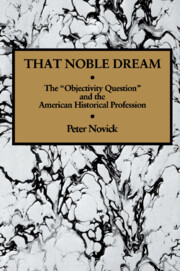Introduction: Nailing jelly to the wall
Published online by Cambridge University Press: 29 March 2011
Summary
At the very center of the professional historical venture is the idea and ideal of “objectivity.” It was the rock on which the venture was constituted, its continuing raison d'être. It has been the quality which the profession has prized and praised above all others—whether in historians or in their works. It has been the key term in defining progress in historical scholarship: moving ever closer to the objective truth about the past. Anyone interested in what professional historians are up to—what they think they are doing, or ought to be doing, when they write history—might well begin by considering “the objectivity question.”
In this book I explore the fortunes of the idea of objectivity among American professional historians over the last century. The book recounts how the idea was elaborated, modified, challenged, and defended; the ways in which the idea furthered (and some ways in which it retarded) professional historical scholarship; how other values and agendas of historians have sometimes complemented, and sometimes contradicted, the goal of pursuing objectivity. I do my best to sort out the influences which have moved successive generations of professional historians this way and that on the objectivity question over the past hundred years.
“Historical objectivity” is not a single idea, but rather a sprawling collection of assumptions, attitudes, aspirations, and antipathies.
- Type
- Chapter
- Information
- That Noble DreamThe 'Objectivity Question' and the American Historical Profession, pp. 1 - 18Publisher: Cambridge University PressPrint publication year: 1988
- 3
- Cited by



